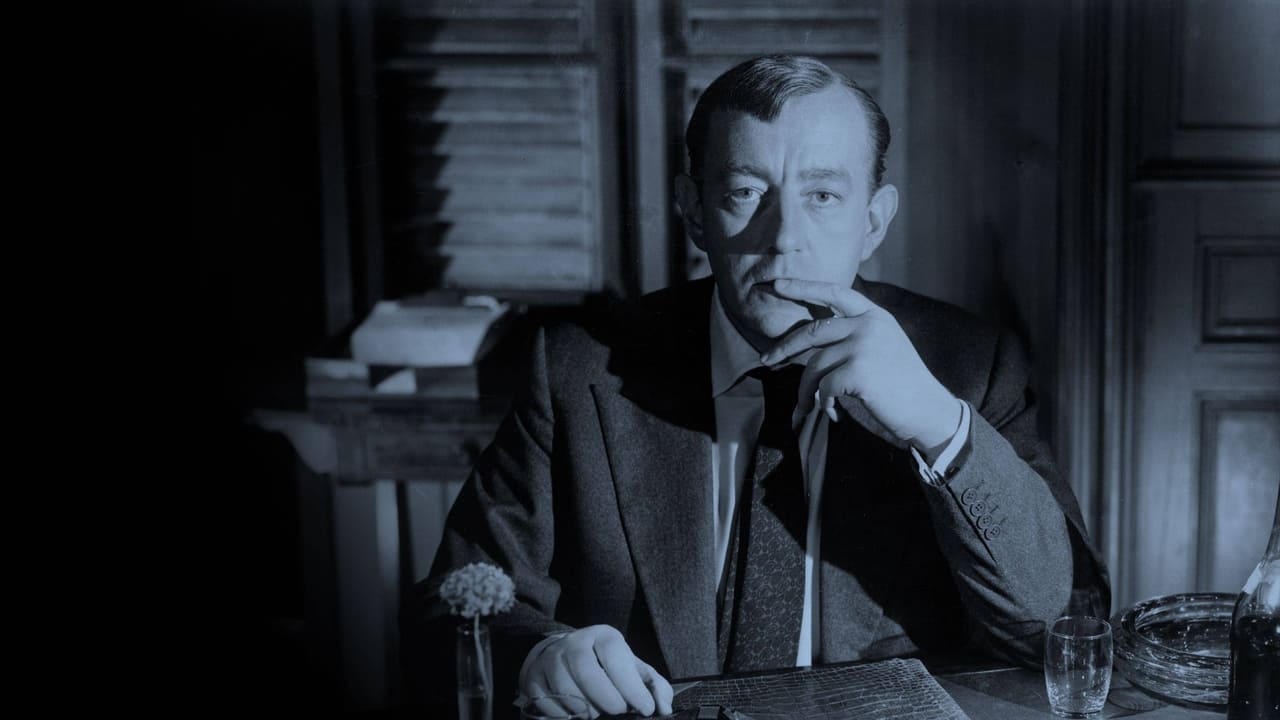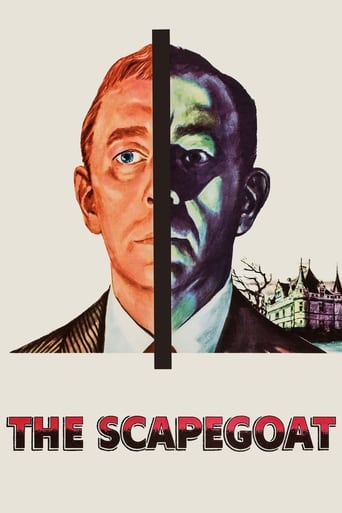

Very Cool!!!
... View MoreHow sad is this?
... View MoreBetter Late Then Never
... View MoreThe film creates a perfect balance between action and depth of basic needs, in the midst of an infertile atmosphere.
... View MoreSomebody wrote that the book is different. Well, I haven't read the book but I've seen the film. And, it's absurd, the whole thing it doesn't make any sense. Yes, Alec Guinness was a very special actor, he acted in many other great movies but, here, he is trapped in a nonsense. Having a too small role, the great Bette Davis doesn't show too much.
... View MoreProducer: Michael Balcon. Executive producers: Daphne Du Maurier, Alec Guinness. Copyright August 1959 by Du Maurier-Guinness Productions. Released through Metro-Goldwyn-Mayer. New York opening at the Guild: 6 August 1959. U.S. release: August 1959. U.K. trade premiere: August 1959. Australian release: 22 October 1959. Sydney opening at the Liberty. 92 minutes. NOTES: Location scenes filmed in the Loire Valley, France. COMMENT: Newsweek headed their review of the book with the caption, "Take Me Back to Manderlay". Indeed, there are so many echoes of Rebecca in the film, it often seems the sprawling chateau and its atmospheric surrounds is the real star of the movie rather than Mr Guinness, or rather two of Mr Guinness who revels in the cleverly crafted split screen special effects. Mind you, that is all to the good, for neither Guinness is terribly convincing. Not all his fault, either. The book takes great pains to point out that the Barrett character can speak French like a native. And what does Mr Guinness speak? English! Not a word of French, would you believe, in either of his incarnations. The same goes for the rest of the cast. British accents all around. In fact the only person who has a foreign accent is the lovely Nicole Maurey. Still, that is a convention I guess we have to put up with. But even suspending our disbelief, the film still presents insoluble problems. The plot seems not only confused and confusing, but takes an interminable time to get under way. It is Miss Maurey, of course, who makes the picture worth watching. Despite her star billing, Miss Davis has only two or three scenes. It is is young Annabel Bartlett who enjoys the principal female role, though Irene Worth (as the wife) and Pamela Brown (as the sister) are allowed to share in the histrionics. The Scapegoat is one of those rare movies that actually play better (at least in a wide-screen format) on television where the viewer can relax in comfort and doesn't really care how long the plot takes to make itself clear, or how talkative and slow-moving it all is. True, attractively atmospheric scenery and a fair dollop of production values help too.
... View MoreBased on a Daphne du Maurier source-text, THE SCAPEGOAT is very much in the tradition established by Hamer's more famous earlier film KIND HEARTS AND CORONETS (1949), also starring Guinness. In this film Guinness plays two roles; that of a mild-mannered university teacher whose identity is stolen by a rakish French aristocrat. The university teacher takes over the aristocrat's life, and proves rather good at it; so much so that he does not want to recover his old life when the aristocrat asks him to. The climax is a violent one. Hamer's film, although set in France, takes a particularly English approach to death; the performances are quietly understated, and the atmosphere of menace restrained. Bette Davis seems rather out of place in a cameo role as the aristocrat's mother; her grande dame performance, complete with rolling New England vowels, contrasts starkly with that of Guinness. The ending is a bit peremptory, betraying the fact that THE SCAPEGOAT was not without its production difficulties, especially when scriptwriter Gore Vidal had to deal with an increasingly alcoholic director. Nonetheless THE SCAPEGOAT is definitely worth a view, if only for Guinness' versatility as an actor.
... View More"The Scapegoat" starts out with a clever premise and the promise of intrigue, but soon settles down as a character study marked by good, solid acting. Alec Guinness is the star with a dual role, first as a drab professor with an empty life, and then as the scion of a wealthy family who parties, womanizes and neglects his family. They meet and decide to switch places. The professor now has a life, but the rich guy vanishes.Now follows an absorbing story, based on a novel by Daphne DuMaurier, as the professor enjoys his new surroundings and tries to inject some heart and purpose into his new life, which arouses some suspicions. This may have been a novella fleshed out to a feature-length movie, and I say this because the picture does go on, and the pace is somewhat sluggish - that is, until the surprise ending.Guinness, Irene Worth and Nicole Maurey put this British/MGM film over with superb acting, with an enlarged cameo by Bette Davis. "The Scapegoat" is something of a departure for Alec Guinness as he gets to show off his considerable acting chops, and there are no comic interludes to be found. The viewer is kept in the dark regarding a solution until the very end, and the end is worth the preceding 90 minutes.
... View More